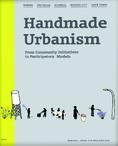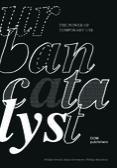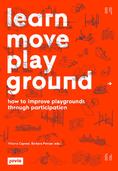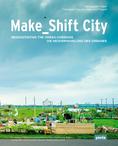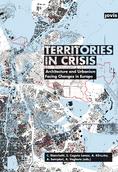città storica agriculture social practices habitability composition welfare Communication paesaggio competition progetto urbano inclusive processes social capital simulation urban projects immigration heritage inu study day urbanism dottorati rigenerazione urbana local development climate change participation settlements city-regions
Handmade Urbanism
From Community Initiatives to Participatory Models
Marcos L. Rosa, Ute E. Weiland (eds.), foreword by Richard Sennett
People have always been interested in the cities in which they live. With the world‘s stark urbanization, the engagement of citizens to improve their urban environments is also growing. Far from the traditional urban planning culture, they make use of limited resources, offering solutions to face the challenges these cities offer. They focus on the provision of social infrastructure aiming to improve the living conditions of the residents at the local scale.
Handmade Urbanism showcases 15 projects realized mostly in less favored areas of five major cities in emerging countries, examining the potential of urban transformation embedded in community initiatives. What is the basis for such initiatives? Which are the instruments and tools they use? Illustrations depict their operational modes, reveal the actors involved and trace the steps they made in the organization of the initiatives. Interviews with experts, actors and different stakeholders clarify their meaning towards the local challenges. At a global level, common threads and differences are made clear.
Handmade Urbanism drafts a possible urban vision of the city impacted by those processes and organizes a discussion that promotes participatory initiatives while exploring their potential to impact on the city at large – to the benefit of all.
• The publication includes the documentary 'Urban Future' in DVD, which provides the reader with further information from the ground.
CONTENTS
INTRODUCTION
• Introductory Interview: Returning to the Roots
Wolfgang Nowak
• Initial Thoughts: Make the Invisible Visible
Ute E. Weiland
• Foreword: The Community
Richard Sennett
• Editorial: An Urban Trend: Residents Taking Ownership of their Environment
Marcos L. Rosa, Ute E. Weiland, with Ana Álvarez, Lindsay Bush, Demet Mutman, Priya Shankar
FIVE CITIES
Introduction to Five Cities
1. MUMBAI
Priya Shankar
Initiatives
• Mumbai Waterfronts Center
• Triratna Prerana Mandal
• Urban Design Research Institute
Interviews
• Dreams, Dignity and Changing Realities: The Story of a Community Toilet
Dilip Kadam, Dayanand Jadhav, Dayanand Mohite
• Network, Intermediate, Integrate: Reaching out to the Grassroots
Seema Redkar
• Elastic Urbanism: Sustainability and Informality in the City
Rahul Mehrotra
• Making Voices Heard: Art and Activism
Shabama Azmi
• Democratizing Public Space
P. K. Das
2. SAO PAULO
Marcos L. Rosa
Initiatives
• Union Building
• ACAIA Institute
• Biourban
Interviews
• Workshops as a Communication Facilitator: Understanding Community Needs
Ana Cristina Cintra Camargo
• Preexistence in Socially Vulnerable Areas
Elisabete França
• Scaling Up Micro Actions
Fernando de Mello Franco
• How to Live Together
Lisette Lagnado
• The Challenge of Derelict and Residual Spaces. Is Anyone Thinking on the Local Level?
Nevoral Alves Bucheroni
3. ISTAMBUL
Demet Mutman
Initiatives
• Music for Peace
• Nurtepe First Step Cooperative
• Children of Hope—Youth House
Interviews
• Presence and Vision of a Grass Roots Initiative
Yeliz Yalın Baki
• New Planning Approaches for Building Up Cities
Erhan Demirdizen
• Action and Participation in Planning
Özlem Ünsal
• Curating Artists and Cultural Practices
Behiç Ak
• Advocating Sustainable and Participatory Models
Aslı Kıyak I˙ngin
4. MEXICO CITY
Ana Álvarez
Initiatives
• Miravalle Community Council
• Cultural Center Consejo Agrarista
• Recovering Spaces for Life
Interviews
• Weaving Efforts: Working for the Common Good
Francisco Javier Conde González
• Reality Surpasses Us: We Need to Be More Flexible and Porous
Felipe Leal
• Unfolding New Professional Profiles for Bottom-up Urban Planning
Arturo Mier y Terán
• Cultural Acupuncture over the City
Argel Gómez and Benjamín González
• Braiding the Physical and the Social: A New Social Contract for the City
Jose Castillo
5. CAPE TOWN
Lindsay Bush
Initiatives
• Mothers Unite
• Rocklands Urban Abundance Center
• Thrive
Interviews
• Incidental Urban Acupuncture
Carol Jacobs
• Breaking it Down to Build it Up
Michael Krause
• Reimagining the City from a Different Viewpoint
Edgar Pieterse
• Lighting the Fire within Us
Malika Ndlovu
• Going Local: The Lavender Hill Area
Councilor Shaun August
COMMON POINTS
• Four Interviews: Five Cities, One Gaze
• The Significance of Space in Urban Society
Ricky Burdett
• Reporting from Local Initiatives
Olaf Jacobs
• Cities are an Expression of Human Needs
Wolfgang Nowak
• Focus on Results: Attention to Real Needs
Anthony Williams
• Project Categories, Programs and Common Clouds
• Final Considerations
Marcos L. Rosa and Ute E. Weiland
• Credits
ABOUT THE AUTHORS:
Marcos L. Rosa is an architect and urban plenner. He received diploma in architecture and urban planning from. He organized the DBUA Award in São Paulo, in 2008, when he set up a research platform based on the 133 compiled projects. He is the author of a publication of that research entitled Microplanning, Urban Creative Practices (São Paulo, 2011). He exhibited worldwide, among which, in the Rotterdam International Architecture Biennale 2010 and in the International Biennale in São Paulo 2011. He was awarded the Young Architects Award from the Brazilian Architects Institute for Microplanning. His current research focuses on the operational mechanisms embedded in these projects and their scaling potential within existing and proposed urban infrastructural networks.
Ute Elisabeth Weiland has been the Deputy Director of the Alfred Herrhausen Society, Deutsche Bank's international forum since 2007, a member of the Executive Board of the Urban Age conference series at the London School of Economics since 2004, and since 1 January of 2010 member of the Governing Board of LSE Cites. For five years, she has coordinated all of the awards in five cities, organizing the content and compilation with the local researchers chosen to carry out the communicazion, organization, and fieldwork in each city.
Online resources and links




Planum
The Journal of Urbanism
ISSN 1723-0993
owned by
Istituto Nazionale di Urbanistica
published by
Planum Association
ISSN 1723-0993 | Registered at Court of Rome 4/12/2001, num. 514/2001
Web site realized by ChannelWeb & Planum Association | Powered by BEdita 3
